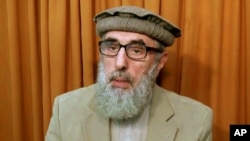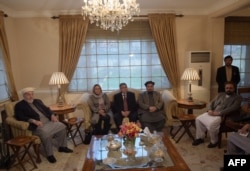Authorities in Afghanistan say a roadside bomb attack Sunday killed a provincial police chief and wounded at least three security guards.
Officials in eastern Nangarhar province say slain General Zorawar Zahid was leading a counter insurgency operation in the troubled Hasarak district when his vehicle hit an improvised explosive device.
A Taliban spokesman says the group planted the bomb and claimed the explosion also killed several security guards with Zahid.
In addition to Taliban insurgents, extremists linked to the Islamic State terrorist group are also active in at least two districts of Nangarhar, which borders Pakistan.
Meanwhile, a fugitive former Afghan warlord on Sunday alleged that internal differences prevented President Ashraf Ghani's government from announcing a peace deal his insurgent group has signed with Kabul to quit violence.
Afghan authorities were not available immediately to comment on Gulbuddin Hekmatyar’s assertions. The Hezb-i-Islami Afghanistan (HIA) faction he leads has held months of negotiations with Ghani’s representatives and both sides admitted the process had led to a draft peace agreement.
In his Sunday statement sent to reporters, Hekmatyar asserted he has agreed and signed the document, and the government was scheduled to announce the final peace agreement on Saturday.
“But once again internal disputes within the government have prevented it from announcing the deal,” said the former warlord.
Peace process
A presidential palace spokesman on Saturday also spoke of "considerable progress" in the peace process and promised more “positive developments" by the end of day. But officials have since not offered any comments nor have they given any reaction to Hekmatyar's assertions.
A peace deal with Hekmatyar’s group, which has fought alongside the Taliban against the U.S.-backed Afghan government, could put pressure on the Taliban to come to the table for peace talks.
Unlike the Islamist insurgency, the Hekmatyar group’s influence is limited to very few provinces in Afghanistan.
Hekmatyar is a longtime guerrilla commander whose forces fought against the Soviet Union in the 1980s, using equipment supplied by the CIA. Later, his militias battled the Taliban for control of Afghanistan during the brutal civil war of the 1990s and human rights groups accused Hekmatyar of committing massive rights abuses among other atrocities.
He was designated a "global terrorist" by the United States in 2003 for allegedly participating in and supporting attacks by al Qaida and Taliban forces against American forces in the country.
Hekmatyar and his commanders are allegedly sheltering in neighboring Pakistan, where Taliban leaders also have their sanctuaries, charges Islamabad rejects.
President Ghani and his governing partner Chief Executive Abdullah Abdullah have recently gone public with the simmering disputes between them over governance issues. Abdullah accused Ghani of not implementing a political deal the United States mediated between them two years ago that paved the way for establishing the unity government.
The political tensions have worried Afghans and the country’s international backers, led by the United States, at a time if intensified battlefield and other attacks by the Taliban.






